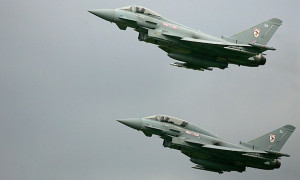
Notwithstanding the otherwise well propagated discourse of “anti-terrorism”, it cannot be gainsaid that the underlying reason for British involvement in Syria lies in the US, and the West’s on the whole, inability to achieve what they have been trying to achieve since at least 2011: regime change in Syria and subsequent monopoly over flow of oil and gas to Western Europe.
While Cameron-and-company were quick to associate the need for Britain to join the U.S. led coalition to the so-called “growing pressure on them”, especially in the wake of Paris attacks, to “do something” against ISIS, it is far from convincing enough that the need to “do something” had necessarily to take the form of a military attack.
On the contrary, far from having been merely motivated by eliminating the ISIS, the underlying logic of Britain’s involvement remains removal of Assad—a goal that might pave the way for another epoch of bloodbath in Syria. For instance, were Assad to be removed from power and Sunni extremists to take over Syria consequently, the utmost atrocities that religious minorities in Syria will be subjected to are unimaginable. Assad’s rule in not only legitimate in the sense it has popular support but also an essential pillar of support for minorities, especially Alawites, Christians and Kurds, against a Sunni onslaught—a pillar that the West and its regional allies are trying to demolish. It is not a hypothetical scenario, this is exactly what Cameron had in mind when he stated that British air campaign in Syria will be supported on the ground by 70,000 `moderate troops.’
To this effect, “Great” Britain’s involvement in the conflict in Syria has less to do with ISIS than it has to ensuring an Islamist takeover of Syria. While the option of sending troops in Syria was ruled out, the actual reason for not sending British troops in Syria is that they are neither sure of an easy victory nor have they forgotten the various failures they had had to face in Afghanistan and Iraq.
In the same vain, the fact that Britain will be bombing Syria from the air is a reflection of what simply can be called the plan to destroy Syria rather than rid it of the menace of ISIS. While there is much wishful thinking about moderates doing the ground fighting against the IS, the fact remains that thus far, the only capable ground troops available are the Syrian army. Lately, they have been regaining some of the ground lost to rebels, thanks to Russian air support. The Kurds will fight to defend their land in Iraq and Syria, but have no motivation to do the fighting for others. They are also being bombed regularly by the Turks, supposedly allied with the West against the ISIS.
Britain’s direct involvement in Syria has been greatly facilitated by the very position Cameron had taken against Russia’s indiscriminate bombing of terrorist organizations, including ISIS, in Syria. Ground realities, however, tend strongly to challenge this propagandist argument. For instance, recent developments have clearly shown that the Russian military campaign in Syria has yielded some very significant results, and nowhere is this success more visible than, for instance, in the recent takeover of al-Qaryatayn, a largely Christian town captured by ISIS in the summer. Russian planes launched 40 air strikes around the town in a 24-hour period.
This latest success does open up an interesting debate about and directly poses a question to the West’s anti-Russian and pro-extremist position. If the prime motivation for the “Great” Britain was to really eliminate ISIS, it could have directed its energies to convincing the U.S. of the need to target ISIS jointly with Russia instead of just jumping on the US driven bandwagon.
This particular position of Cameron also opens up the question about the wisdom of blindly following the U.S. in its footsteps. In fact, it is not so difficult a scenario to grasp that political action by Britain is, in any case, constrained by the U.S., which does not want ISIS, President Bashar al-Assad or the forces headed by the al-Qaeda affiliate, the al-Nusra Front, to win the Syrian civil war decisively. Washington is trying to pretend that there is a moderate Syrian constituency opposed to these three parties capable of taking power in Damascus. David Cameron similarly expresses belief that not only does such a moderate force exist, but that it numbers 70,000 fighters, many of them members of the Free Syrian Army, an institution that was always an umbrella group, carrying forward the Western agenda.
It is self-evident that Britain does not have well thought-out and coherent strategy of its own, rather it is only trying to insert itself in Syria to carve out a position for herself in a hypothetical post-Assad scenario. A “minus-Assad” scenario is the gaol Britain has been, along with the U.S., to achieve and this was the primary motivation for the British Government when it failed to secure a vote on Syria as early as 2013. The current vote given on (supposedly) bombing ISIS is what the British Government wanted to have two years ago.
British involvement, howsoever secured, is going to make little impact, militarily speaking. Its involvement in Iraq and Afghanistan has been of very little assistance in terms of helping the U.S. in achieving “total victory.” While whether it can guide the U.S. to victory, or any meaningful success, in Syria or not is a moot question, there is hardly anything to gainsay that for “Great Britain” the primary goal is to re-position itself among global players as a major power. Simply speaking, with France already directly involved in Syria, Britain could no longer afford, politically speaking, to be left out of Syria and consequently face a political eclipse in a territory that was once its colony.
Salman Rafi Sheikh, research-analyst of International Relations and Pakistan’s foreign and domestic affairs, exclusively for the online magazine “New Eastern Outlook”.
